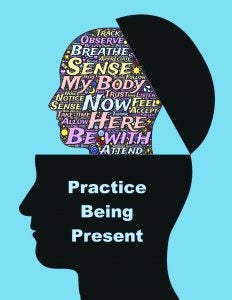Intentional ‘mindfulness’ can help benefit life in wide variety of areas
Published 6:56 am Wednesday, September 5, 2018

- Public domain
By ALETHEA PRICE
Boyle County Extension Agent for Family and Consumer Sciences
Fingers holding cell phones; constant updates via social media; 24/7 news alerts; and demands from work and home help create a world that is full of noise, chaos and all kinds of stressors that bombard us each day.
Sometimes, we can get caught up in these stressors or events and allow them to take control over our lives and reduce our quality of life.
Stress causes more than just anxiety; it can manifest in your body and cause physical ailments, as well. It can cause muscle pain and headaches; affect your sleep; and increase your risk for heart attack and stroke.
Next time you are faced with a particularly stressful encounter or situation, try using mindfulness to reduce your stress and return your focus to what is important to you.
Mindfulness requires you to purposely pay attention to what is happening in the present moment. The most common method is to focus on breathing in and out, clearing your mind of thoughts. You can also focus on your physical self, your surroundings or your movements as you do a normal daily activity such as walking. Mindfulness helps you re-center, reduces external distractions and allows you to evaluate yourself and your reactions to the stressors around you.

Public domain
Sure, this may sound like something so simple it couldn’t possibly work. But that’s the beauty of it. Simplify the moment. Break it down into smaller pieces so you can digest it. Focus on one thing at a time and the rest will fall into place. This can be an opportunity to relieve yourself from your phone, the internet and any other unnecessary outside distractions that pulls your focus in too many different directions.
Remember, there will always be stress, but you are in control of how you react to it.
Mindfulness-based stress reduction has been around since the 1970s, and numerous scientific studies have shown its effectiveness in stress reduction, as well as other positive benefits, including a decrease in anxiety and depression. Some studies have shown mindful eating can be a tool for weight management.
Mindful eating is the same concept as general mindfulness. It’s related to being more aware of what you’re eating.
Instead of inhaling your food in a hurried rush, take time to sit down and really enjoy your food. Use all five senses to experience what you’re eating. Hear the crunch of an apple or the sizzle of a fajita platter. Smell the smells, savor the flavors.
But most importantly, enjoy your company.
Share a meal with your family and friends. Sharing a meal usually leads to sharing a conversation and that (without a cell phone) is pretty great too.
You can practice mindfulness anytime or anywhere as long as you turn your focus inward and allow distractions to fade away. Live in this moment, and enjoy it.
For more information on mindfulness, contact a.price@uky.edu.






